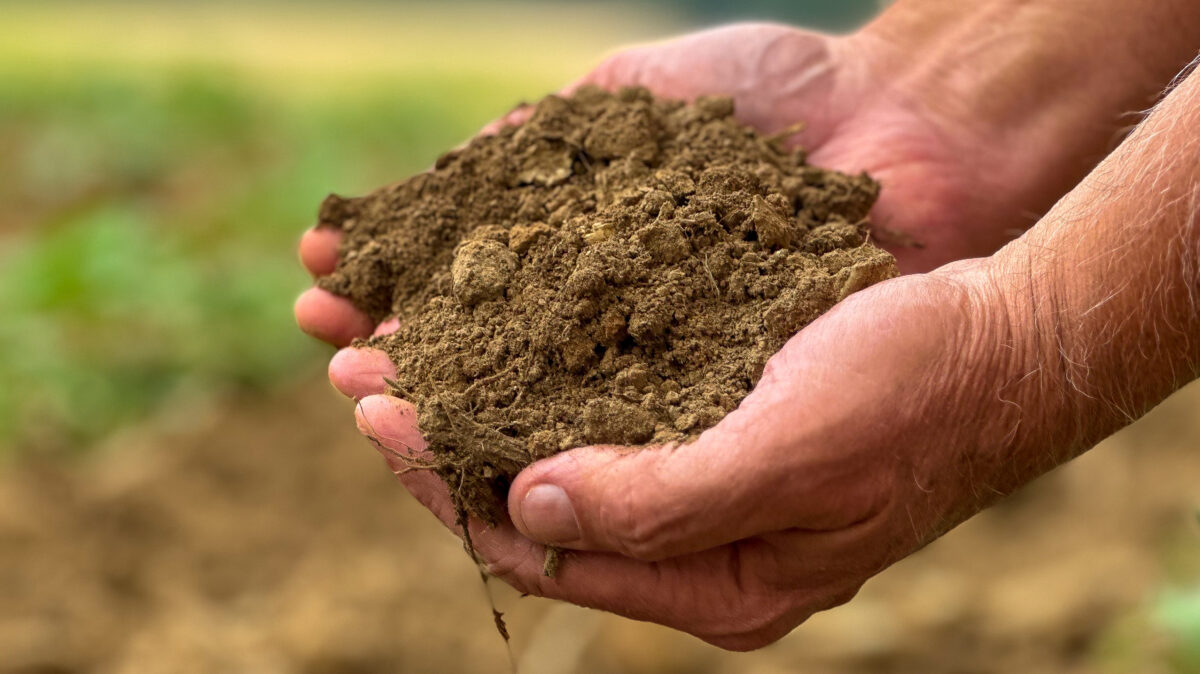A Sustainable Harvest
TOPICS
SustainabilityZippy Duvall
President

photo credit: AFBF Photo, Morgan Walker
Zippy Duvall
President
As farmers and ranchers, we know we are part of a bigger story. We are caretakers of the land for a time, following in the footsteps of generations before us. My farm didn’t start with me and, God-willing, it won’t end with me either. Sustainability is personal for me as a farmer: I’ve got my hands in the dirt that my parents and their parents before them farmed. And that soil, the lifeblood of my farm, is healthier now than ever before because of the care we have taken to farm better each day. Agriculture’s sustainability story is one of progress, and it’s not finished yet.
U.S. agriculture has made great strides, in the last several decades especially, when it comes to leaving a smaller footprint on the land we farm. American farmers 30 years ago would have needed 100 million more acres to match production today. That progress has come thanks to better seeds, technology and climate-smart farming practices that protect the soil, conserve water, retain nutrients, prevent runoff and reduce greenhouse gas emissions. In fact, U.S. agriculture contributes less than 10% to overall GHGs by industry, and we’re working to get that number even lower. Farmers are also doing more to recapture carbon and convert waste into clean energy with innovative tools like methane digesters and voluntary conservation programs that preserve grasslands, forests and wetlands.
At the American Farm Bureau, we are proud of agriculture’s sustainability story, and we believe that we can continue to build on that success together.
We need to do a better job of telling this story. Consumers are eager to hear from farmers and have a high level of trust in the people who grow their food. A recent survey by American Farm Bureau shows that trust has increased over this year to 88%: that’s almost 9 in 10 Americans. That same survey also found that while most folks couldn’t accurately identify agriculture’s low impact on GHGs, their support grew when presented with the facts. More than 80% were impressed to learn that farmers have put 140 million acres in conservation programs, more than doubled renewable energy sources used on the farm, and nearly tripled food production in the last 70 years with the same or fewer resources.
The public also agrees that sustainability means keeping family farms in business for generations to come, and that the work of sustainability should not fall solely on the farmer’s shoulders. Farmers and ranchers haven’t made these impressive strides alone, and we can’t move forward alone either. Investments in agricultural research and innovation will continue to be critical in taking us to the next phase of climate-smart farming. At Farm Bureau, we also know the importance of coming together across the industry and reaching outside our fencerows to partners who share our goals for strengthening sustainable agriculture.
Just last week we announced a historic alliance with organizations representing farmers, ranchers, forest owners, the food sector, state governments and environmental advocates, called the Food and Agriculture Climate Alliance. The founding members are diverse, but we are united around the goal of developing and promoting voluntary, market- and incentive-based climate solutions. At the American Farm Bureau, we are proud of agriculture’s sustainability story, and we believe that we can continue to build on that success together. This new alliance was formed in February and has been working diligently to develop 40 recommendations built around three key principles:
- Support voluntary, market- and incentive-based policies.
- Advance science-based outcomes.
- Promote resilience and help rural economies better adapt to changes in the climate.
As momentum builds around climate action, agriculture can continue to play a positive role in reducing emissions and protecting our natural resources, and we want to lead the way in finding solutions that promote sustainability on and off the farm. Voluntary and market-based conservation efforts have a proven track record of success on and off the farm, and together we will continue to work for policies that respect farmers and support positive change.
There’s still much work to do, not only on climate but on other critical issues facing rural America and the farm economy now and in the coming year. But as I reflect on harvest time, I am reminded that the seeds sown will yield a fruitful harvest. Farmers and ranchers never shy away from hard work. That perseverance has carried us through many a hard time, grown us closer as communities and carried us on in hope of better harvests to come.
Zippy Duvall
President
Vincent “Zippy” Duvall, a poultry, cattle and hay producer from Greene County, Georgia, is the 12th president of the American Farm Bureau Federation.
Top Issues
VIEW ALL